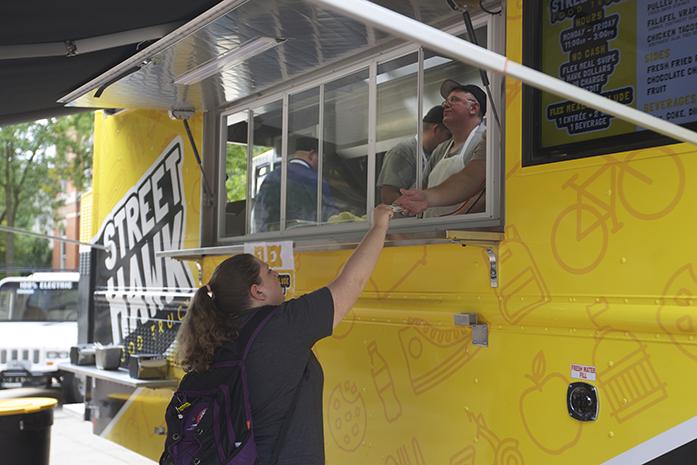The Iowa City City Council is looking at a ninety-day pilot program for increased food truck operations downtown.
By Molly Hunter
The Iowa City City Council may consider amendments to an ordinance that would allow increased food truck operations downtown.
The Iowa City Mobile Vending Association shared a pilot-program proposal with the council on Oct. 11. The proposal would allow between six and 10 food trucks to set up shop downtown as part of the pilot program. The council discussed the proposal at its Tuesday evening meeting.
Kyle Sieck, the owner of Local Burrito and a member of the vending association, has been a vocal advocate for food truck operators in Iowa City.
“I’ve been involved with the City Council and these ordinances, and I kind of have the position that you have to be a voice for other food trucks in town,” he said.
Sieck, who began the Local Burrito in 2009 at the Farmers’ Market, said the business has grown since then. Three years ago, he began operating a food truck. He said he mainly uses his food truck to cater for large events but sees the appeal of operating downtown.
“Obviously, I think it would be a profitable venture,” he said. “I think people would appreciate the food.”
Sieck said the current restrictions on food-truck operations were mainly a response to concerns about business competition expressed by existing restaurants.
“A handful of businesses downtown are afraid … we’ll steal their business,” he said. “We respond to that by saying the complete opposite. There’s a lot of evidence around the country that when you have an organized food-truck setting, it draws people.”
However, Assistant to the City Manager Simon Andrew said there are other concerns about allowing an increased number of food trucks downtown. These include questions about public health and sanitation, as well as the effects on the flow of pedestrian, bicycle, and vehicle traffic in the dense area.
Currently, there are no designated food-truck parking spaces. Food-truck operators must vend from street meter spaces. In their memo to City Council, the association indicated that the lack of designated parking spaces is something that they hope to address.
The association also advocates to alter the restrictions on food-truck operations in certain zones. Currently, food trucks are prohibited within 150 feet of any brick and mortar restaurant or University of Iowa food-service operation. The association hopes to lower this rule to 100 feet.
They also propose changes that would allow some operation in downtown spaces in which food trucks are currently banned.
“The downtown zone and the North Side Marketplace … are so densely populated with restaurants that measuring out 150 feet, especially as restaurants close and open, is not really necessary,” Andrew said. “That 150 feet is going to cover the whole downtown area, so it was just easier to do it by square block rather than tying it to that 150 feet.”
The vending association wants to lift the ban on food trucks in these areas between 10 p.m. and 3 a.m. In other parts of the city, the regular hours of food-truck operation between 7 a.m. and 9 p.m. would remain unchanged. According to the vending association, this change is designed with the concerns of brick and mortar restaurants in mind.
Andrew said, “The memo that was provided to council stated that most [brick and mortar restaurants] close before 10 or 11.”
By operating after most brick and mortar restaurants have closed, Andrew said, the vending association hopes to avoid creating competition.
UI Student Government liaison to the City Council Jacob Simpson said he thinks more food trucks downtown would benefit students.
“Student government wants more affordable food options for students to work with,” he said. “A lot of times they’re cornered into buying meals from Housing & Dining, or they have to buy meals from the brick and mortar restaurants downtown, which is far more expensive, and it takes more time, and you may not have diverse options. Whereas the food trucks … are quicker, typically, easier to access, and eventually … are cheaper.”







